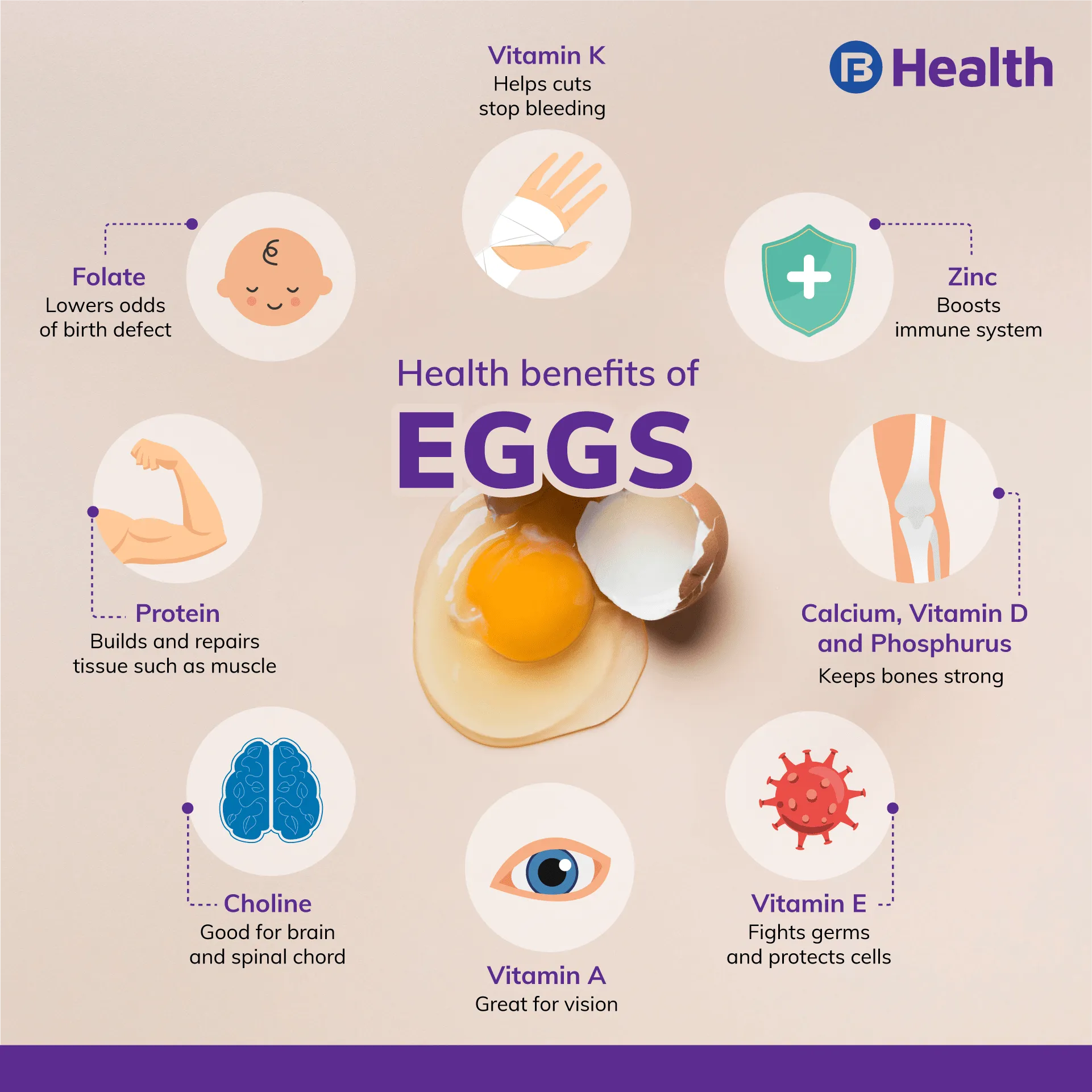Dietitian/Nutritionist | 6 min read
Make Your Diet ‘Egg’cellent: Important Nutrition Facts Of Eggs To Keep In Mind!
Medically reviewed by
Table of Content
Key Takeaways
- The nutritional value of one egg is quite high compared to its calorie cost
- Eating egg whites alone may not be smart and yolk contain numerous benefits
- Lower heat and longer cook times are the healthiest way of cooking eggs
Whether they are scrambled, boiled, poached or baked, eggs are among the healthiest foods to include in your diet. They are inexpensive to buy and offer a whole gamut of healthy nutrients. The primary composition of eggs includes protein, vitamins, healthy fats, various nutrients and minerals. Eggs also have distinctive properties due to which they are exceptionally good at helping you achieve your weight loss goals. For instance, the number of calories in a whole egg are just around 74-78, depending on its size. Before we delve into the nutritional value of one egg, keep in mind that the way you prepare eggs can have a drastic effect on the nutrient profile. For example, if the eggs are deep fried in butter or oil, nearly 50 calories get added for every additional teaspoon used! So, try to ensure healthy cooking when including eggs in your diet.
Cooked eggs are also considered safer to consume, as the nutrients, particularly proteins, become easier to digest. By cooking eggs, you also eliminate the bacteria, thereby making them safer to eat. As per studies, the human body could utilise nearly 91% of the protein in cooked eggs vis-à-vis just 51% from raw eggs.
Read on to know more about the important nutrition facts of egg, such as a boiled egg nutrition info as well as egg white nutrition facts.
Egg white vs egg yolk: Which is better?
Have you ever considered the egg white nutritional value and that of yolks separately? It is important to know that eating the whole egg, with the white and yolk together, is actually better for you as it provides a balance of calories, fats and proteins.
Egg white has significant nutritional value, is protein rich foods, and a boon for slimming down. Albumen, the protein in egg white, is what helps you keep fit. On the other hand, egg yolk is loaded with essential fats and other nutrients. Since fat and increased cholesterol can pose a major risk for the heart, its intake needs to be controlled. Nevertheless, doctors recommend at least one egg per day for boosting good health.
Whole egg nutrition facts
(for a medium-large egg)
Egg white nutritional value | Egg yolk nutritional value |
| Protein: 3.6-4 g | Protein: 2.7 g |
| Sodium: 55 mg | Cholesterol: 185-210 mg |
| Calories: 17 | Saturated fat: 1.6 g |
| Total fat: 4.5-5 g | |
| Sodium: 8 mg | |
| Calories: 55 |
Boiled egg nutrition information
(for a medium-size egg)
Calories: 78 kcal
Protein: 6.29 g
Carbohydrate: 0.56 g
Total fat: 5.3 g
Cholesterol: 186 mg

Why eggs are a must-have
- Excellent for weight loss: Consuming eggs for breakfast is extremely helpful for weight-loss management. In fact, egg breakfasts are known to cause nearly 65% more weight loss over eight weeks compared to other breakfast options with the same calorie content. An egg is also known to stabilise blood glucose levels and insulin response.
- Reduces your calorie consumption: Creating a meal with eggs, may normally mean using around 2-3 eggs. Here are 1 egg nutrition facts to keep in mind: It contains just 77 calories, 6.3g proteins, and 0.6g carbs. Additionally, three large, boiled eggs comprise lower than 240 calories. With the addition of vegetables, you can have a whole and balanced meal within just 300 calories! Moreover, eggs are cheap and can be easily incorporated into your diet using a little bit of creativity in the kitchen.
- Ranks high in the satiety index: Protein-rich foods are helpful to increase fullness and lower one’s appetite. Eggs are significantly filling and high in nutrients, primarily due to their considerable protein content. Also, eggs rank high on the Satiety Index, which looks at foods that assist you in feeling full and decrease your calorie intake thereafter.
Apart from the above, here are the various benefits of consuming egg yolks
- To boost your immunity – As specific compounds present in egg yolk membranes help in producing macrophages, which safeguard your body against infections
- To lower the risk of gastrointestinal problems – As egg yolk proteins decrease inflammation
- To reduce blood pressure – As peptides in egg yolks lower BP and reduce the risk of cardiovascular problems
- To reduce problems related to vision – As carotenoids in yolks lower the risk of developing cataracts
Here’s how eating eggs is a healthy choice
- To reduce the risk of heart disease
- To improve your skin
- To help you brain and nervous system perform optimally
- To build strong muscles
- To ensure fewer health risks during pregnancy
How to check the quality of eggs at home?
You can do a simple float test at home to see if the eggs are fresh or stale.
- Take a glass of water and dip the egg.
- Carefully consider the egg’s position. If it sinks to the bottom, it is considered to be fresh. If it is mildly older, it will be at the bottom on one end of the glass.
- A rotten egg will float on the water’s surface.
Healthy tips for cooking eggs
Remember that shorter and lower heat cooking methods are best suited for eggs as they decrease oxidation and help in maintaining most of the nutrients. Make them healthier by adopting some of the best cooking practises. Here’s how:
- Combine them with vegetables such as spinach, mushroom, tomatoes, bell peppers (red, green and yellow), green onions, and carrot
- Opt for a low-calorie cooking method that doesn’t require any addition of fats such as boiling or poaching eggs
- Fry eggs in oil that is stable at high temperatures such as sunflower, peanut, or olive oil to eliminate the release of free radicals
- Avoid overcooking eggs to retain nutrients
- Select the most nutritious eggs if possible, such as omega-3-enriched eggs, organic or pasture-raised eggs
Best cooking methods to retain nutrients
Besides being delicious and adaptable, eggs can be cooked in various methods and also pair well with healthy sides. Take a look some of the common cooking methods below.
- Baked: A flat-bottomed dish is used to bake eggs in a hot oven until they are set.
- Poached: Poached eggs are immersed in simmering water and cooked for 2.5 to 3 minutes.
- Boiled: Eggs are cooked in their shells in boiling water for about 6–10 minutes, based on how well-cooked the yolk needs to be. The nutritional value of boiled eggs is far superior to that of other cooking methods. It is best for weight watchers to consume boiled eggs.
- Omelette: Eggs are beaten and gradually poured into a pan and left to cook until they turn solid. An omelette is not stirred in the pan unlike scrambled eggs.
- Scrambled: Beat eggs in a bowl, pour into a hot pan and stir over low heat until set.
As eggs are considered a wholesome source of nutrition and beneficial for overall good health, plan your meals accordingly. To get the best nutritional advice suited to your body and needs, talk to a general physician or nutritionist. Now you can easily locate a doctor on Bajaj Finserv Health. Search for specialists and book appointments using filters such as experience, fees, area, consultation timings and more. You can even book instant consultations either for an in-person visit or via video. Moreover, the platform is loaded with other healthcare features and deals from best hospitals and wellness centres.
References
- https://pubmed.ncbi.nlm.nih.gov/9772141/
- https://www.healthline.com/nutrition/eating-raw-eggs/
- https://www.ncbi.nlm.nih.gov/pmc/articles/PMC6126094/#:~:text=A%20medium%2Dsized%20boiled%20egg,and%20186%20mg%20is%20cholesterol.
- https://www.ncbi.nlm.nih.gov/pmc/articles/PMC6126094/#:~:text=A%20medium%2Dsized%20boiled%20egg,and%20186%20mg%20is%20cholesterol.
- https://www.ncbi.nlm.nih.gov/pmc/articles/PMC2755181/
Disclaimer
Please note that this article is solely meant for informational purposes and Bajaj Finserv Health Limited (“BFHL”) does not shoulder any responsibility of the views/advice/information expressed/given by the writer/reviewer/originator. This article should not be considered as a substitute for any medical advice, diagnosis or treatment. Always consult with your trusted physician/qualified healthcare professional to evaluate your medical condition. The above article has been reviewed by a qualified doctor and BFHL is not responsible for any damages for any information or services provided by any third party.





